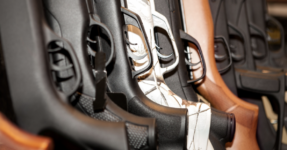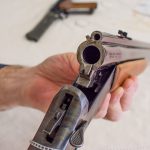The Law, Defences and Penalties for Possessing an Unregistered Firearm in New South Wales

A man is facing a string of criminal charges after a road on a unit in Sydney’s west allegedly uncovered a stash of prohibited firearms, drugs and cash.
According to police, detectives from the State Crime Command’s Organised Crime Squad established a dedicated task force, known as Strike Force Cripe, to investigate an organised criminal group believed to be involved in the manufacture and supply of illicit drugs across New South Wales.
As part of those investigations, officers from the notorious Raptor Squad, formerly known as Strike Force Raptor, stopped a vehicle at 12.10pm on Thursday, 29 December 2022 on Killinger Avenue in Liverpool and spoke with the 22-year old male driver.
Police say that, as a result of conversations with the driver, they formed a suspicion on reasonable grounds that the vehicle contained illegal drugs.
Under section 36 of the Law Enforcement (Powers and Responsibilities) Act 2002, police must either form a ‘reasonable suspicion’ of a particular state of affairs – one of which is the presence of illegal drugs – or obtain a driver’s informed consent before a vehicle can be searched without a warrant.
Police claim that more than 1 kilogram of a white substance, believed to be cocaine, was located during the search, as well as a small quantity of crystal methylamphetamine.
The man was arrested and conveyed to Liverpool Police Station, before police applied for and were granted a warrant to search a unit on Shepherd Street in Liverpool.
They allege the search resulted in the discovery of three firearms, ammunition, 3 kilograms of methylamphetamine, over 1.2 kilograms of cocaine, 775 grams of heroin, over 4.2 kilograms of MDMA (ecstasy) and nearly $75,000 in cash.
The man, who resides in Edensor Park, was then charged with 14 criminal offences, being:
- Three counts of supplying a large commercial quantity of prohibited drugs,
- Two counts of supplying a commercial quantity of prohibited drugs,
- Three counts of unauthorised possession of a pistol,
- Possessing a prohibited drug,
- Possessing unregistered firearms,
- Possessing ammunition without holding a licence, permit or authority to do so,
- Acquiring a firearm part without authority,
- Using or possessing a prohibited weapon without a permit; and
- Knowingly dealing with proceeds of crime ($75,000).
He will face Liverpool Local Court to respond to the allegations.
Offences relating to possessing unregistered firearms in New South Wales
Firearms offences in New South Wales are primarily regulated by the Firearms Act 1996.
However, possessing an unregistered firearm can amount to an offence under both the Firearms Act and the Crimes Act 1900.
Firearms Act 1996 – possessing an unregistered firearm
Possessing an unregistered firearm is an offence under section 36(1) of the Firearms Act 1996 which carries a maximum penalty of 5 years in prison, or 14 years where the firearm is a pistol or prohibited firearm.
To establish the offence, the prosecution must prove beyond reasonable doubt that:
- You supplied, acquired, possessed or used an item,
- The item was a firearm, and
- The firearm was not registered.
What amounts to possession?
Section 4 of the Act provides that you are in ‘possession’ if:
- You have custody of the firearm, or
- You have it in the custody of another person, or
- It is in or on any premises, place, vehicle, vessel or aircraft, whether or not belonging to or occupied by you.
Section 4A of the Act makes clear that possession includes where the item is in or on any premises you own, lease or occupy, or in your care, control or management, unless you satisfy the court that:
- It was placed in or on, or brought into or onto, the premises by or on behalf of a person who was authorised to do so, or
- You did not know and could not reasonably be expected to have known that it was in or on the premises, or
- The evidence otherwise establishes that you were not in possession of the firearm.
What is a premises?
‘Premises’ is defined broadly as any place, vehicle, vessel or aircraft.
What is a firearm?
Section 4 of the Act defines a ‘firearm’ as a gun, or other weapon, that is or was capable of propelling a projectile by means of an explosive, and includes a blank fire firearm, or an air gun, but does not include a paintball marker.
What is a pistol?
A ‘pistol’ is a firearm that:
- is reasonably capable of being raised and fired by one hand, and
- does not exceed the dimensions prescribed by the regulations.
What is a prohibited firearm?
Schedule 1 of the Act contains a long list of ‘prohibit firearms’, which include:
- Machine guns, sub-machine guns and other automatic weapons capable of shooting bullets in rapid succession,
- Self-loading shotguns, rim-fire and centre fire rifles,
- Firearms capable of discharging liquid, powder, gas, chemicals, flares or dye
- Canons and powerheads, and
- Firearms disguised as other items, such as walking sticks.
Imitation firearms
Section 4D makes clear that the definition of firearms, pistols and prohibited firearms extends to ‘imitation firearms’ which are objects that, regardless of colour, weight or composition, or the presence or absence of any moveable parts, substantially duplicate in appearance a firearm, but are not firearms.
Children’s toys
The definition does not, however, extend to items produced and identified as children’s toys.
Defences to the charge
Section 36 makes clear you are not guilty of the offence if you establish ‘on the balance of probabilities’ (in other words, that it was more probable than not) that:
- You did not know, or could not reasonably be expected to have known, that the firearm was unregistered, and
- You were not the owner of the firearm at the time of the alleged offence.
This is known as a ‘statutory defence’.
A further statutory defence is where you establish on the balance of probabilities that you were a licensed firearms dealer and made an application for registration within 24 hours of acquiring or taking possession of the firearm.
An additional statutory defence is where you were a resident of another State or Territory and the firearm was registered under a law in force in that other State or Territory.
General legal defences also apply to the charge, including self-defence, duress and necessity.
Where you are able to raise evidence of a general legal defence, the onus then shifts to the prosecution to prove beyond reasonable doubt that the defence does not apply in your case.
If the prosecution is unable to do so, you are entitled to an acquittal; in other words, a verdict of not guilty.
Crimes Act 1900 – possessing an unregistered firearm in a public place
Possessing an unregistered firearm in a public place is an offence under section 93i of the Firearms Act 1996 which carries a maximum penalty of 10 years in prison, or 14 years where committed in ‘circumstances of aggravation’.
To establish the offence, the prosecution must prove beyond reasonable doubt that:
- You were in possession an unregistered firearm
- You possessed the firearm in a public place, and
- You were not authorised to possess the firearm.
The definitions relating to possession, firearm, pistol and prohibited firearm outlined above apply equally to the offence.
What is a public place?
A ‘public place’ includes any place that is publicly owned as well as privately owned property that is open to members of the public, such as:
- Restaurants, pubs and clubs
- Shopping centres and shops, and
- Sporting venues and cinemas.
What are circumstances of aggravation
‘Circumstances of aggravation’ are present where you possessed:
- More than one unregistered firearm
- An unregistered pistol, or
- An unregistered prohibited firearm.
Defences to the charge
The general legal defences listed above apply equally to this offence.
Going to court for a firearms offence?
If you have been accused of a firearms offence and are going to court, call Sydney Criminal Lawyers anytime on (02) 9261 8881 for strong representation by an experienced criminal defence team who will explain your options, the best way forward and fight for the optimal outcome in your case.






